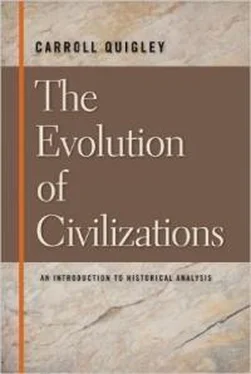Efforts to overcome the chronic economic depression by government action led to a much enlarged governmental bureaucracy and to an increased tax burden. This fell primarily on the landlords because of the dwindling commercial and craft activities, because the army was no longer paying its way from the booty of war but remained an expensive financial burden, and because landed wealth was something the tax collector could lay his hands on. The scarcity of manpower and the efforts of tenants to move from one landlord to another seeking better terms gave the landlords an excuse for refusing to pay taxes. To obviate such excuses, laws were passed forbidding the coloni to move from their tenancies, making these hereditary, and making the landlord responsible for his tenants' taxes since he could be found by the tax collector more easily than they could and his lands would be surety for payment. Thus the coloni tended to become serfs. In time they tended to look to the landlord for protection and for settlement of their disputes. At the same time, as the government became weaker and more remote, the free villagers, or vici, also began to look toward powerful local landlords for these same services of protection and justice. The government passed laws to prevent this growing system of patronage but without stopping it.
The decline of slavery led to decreased accumulation of capital, but investment, as we have seen, had declined earlier and more rapidly. The vital issue was no longer expansion but survival. The political disorders of the third century can be measured by one fact: in sixteen years forty-six emperors or would-be emperors met death by violence. Such disorders, intensified in the fourth and following centuries by the barbarian migrations, led to a flight from the towns to the country. Everyone wanted an established relationship to the food-producing land. As all municipal life decreased in vigor, agrarian units increased in self-sufficiency.
The shift of real power from the senate to the armies began as early as 100 B.C., but was not legally recognized until A.D. 195 when, for the first time, an emperor ruled without any senatorial election. Control of the imperial position became a clear power struggle between army commanders. Because such commanders could no longer retain the loyalty of their forces by periodic distribution of provincial booty and foreign slaves, they rewarded them from the chief remaining source of wealth, the landed holdings of their political opponents. This gradual liquidation of the landed class and their replacement by army leaders sprung from the more remote and backward areas of the empire entirely destroyed the town-dwelling landed elite who had been the carriers of the Classical culture. As this aristocratic, clarid, urban, moderate, mundane culture was destroyed, it was replaced by a welter of unprincipled violence, grasping materialism, crass ignorance, crude illiteracy, and narrow, rural provincialism. In reaction against this, there eventually arose a new spiritualism and asceticism, a flight from worldliness, mingled with all kinds of new religious feelings and dark superstitions but also containing much exalted spirituality. Both of these movements were fatal to the Classical ideology. In fact, it became increasingly difficult to find anyone with allegiance to the Classical idea, and certainly no one was willing to sacrifice or die for it. Yet without its ideology no culture can survive.
7. Invasion
As the Classical civilization grew weaker, its ability to maintain its integrity by defending its frontiers decreased. After these frontiers were established along the Rhine, the Danube, the Euphrates, the Red Sea, and the northern edge of the Sahara, they could not be expanded outward. This stopped the supply of slaves and booty that kept the whole economic system functioning. Efforts were made to push Roman rule across the Rhine, or as far as the Tigris, or across the Red Sea, or even across the Sahara, but all such efforts ultimately failed.
As a matter of fact, Rome had increasing difficulty defending these long-established frontiers themselves. This difficulty arose from a number of factors. Rome itself was getting weaker. Its ideology was losing allegiance everywhere; morale was evaporating; the economic system was declining; the political system was finding it increasingly difficult to get its orders obeyed; the social system was disintegrating. Even the army was becoming completely institutionalized, consisting largely of permanent garrisons, recruited from barbarians, with only local interests, and surely no interest in seeking death for the Classical idea or even for the Roman state. At the same time military problems were changing. Originally Roman infantry was pushing into barbarian territory. Later barbarian horsemen were raiding into imperial territory. Ultimately whole barbarian tribes were migrating into the empire itself. The inability of the famous Roman Legion to withstand charging horsemen made Rome indefensible. Rome had not had to face this problem earlier because adequate rain on the Northern Grasslands, century after century, reduced the tendency for barbarians to move. But decreased rainfall after A.D. 200 created a pressure of moving pastoral peoples that became irresistible. The final blow here was the pressure of the Huns out of the Asiatic steppes and on to the horse-riding Germans along the Roman Danubian frontier. The Gothic victory over the Roman army at Adrianople in 378 showed clearly that the final crisis had been reached.
What could be done? The situation both of the Roman state and of Classical culture was hopeless unless the defensive forces could be shifted quickly from infantry to cavalry. This was impossible, not only for the lack of experience in the techniques of cavalry warfare but equally because the weakened Classical economic system could not support a large number of horses. Horses, as grain-eating animals, compete for food directly with men. The inefficiency of the Classical Mediterranean economy, based on an institutionalized slave system, could not produce such a surplus. Yet without cavalry the society could not resist the intruding barbarians.
In fact, the crisis was more fundamental than the simple fact of military defense. No one any longer had faith in the Classical ideology or in the Classical gods. A new ideology and a new religion were needed. Though they were already at hand in Christianity, they could not be fitted into the Classical culture with which they were fundamentally incompatible.
A new technology was needed and was also available. It would be based on deep plowing with properly harnessed draft animals by persons who would have an interest in doing a good job because any additional output arising from increased care would accrue to themselves. But such a technology was much better adapted to the well-watered, heavy soils north of the Alps in the zones of summer crops than it was to the thin, seasonally watered light soils of the winter-growing Mediterranean.
A new military technique was also available. Based on heavy cavalry, armed with impact weapons, and equipped with strong horses, stirrups, and horseshoes, this technique was extremely expensive (in terms of grain consumption) so that one fighting man had to be supported by a hundred or more tillers of the soil. Here again, the areas north of the Alps, with their more productive grain fields and more adequate grasslands, were far better able to support the new system than was the older Mediterranean area.
The bringing together to form a single culture of these various techniques for satisfying man's basic needs required a new society. Classical society could not do it. When these came together north of the Alps, in the peripheral zone of Classical society, there appeared the core area of a new Western culture. But at the same time, in the old core area of Classical society, in the Aegean, sufficiently profound changes occurred in Classical culture to permit a variant of it to survive for another thousand years. This gives rise to one of the greatest puzzles of analytic history: Was Byzantine culture a new society or was it merely a revived Classical culture? Or is it possible that Byzantine culture is an earlier phase of Orthodox (Russian) civilization? In view of the fact that Byzantine culture had a different religion, ideology, social organization, military and economic technology, and almost certainly a different organization of expansion, it seems difficult to regard it as simply a reformed Classical culture. Its relative continuity in politics and law is not that significant. On the other hand, it hardly seems feasible to regard Byzantium as a wholly new civilization. Its brief life of about a thousand years would make it a rival with Hittite society for the position of the shortest-lived of all civilizations. Whatever decision is made in this difficult problem is bound to be unsatisfactory from many points of view, just as a mass of quartz at the junction of two or more crystals cannot be attributed to one or another with any assurance.
Читать дальше










